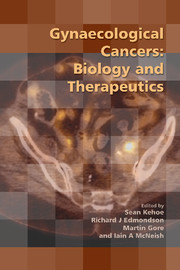Book contents
- Frontmatter
- Contents
- Participants
- Declarations of personal interest
- Preface
- SECTION 1 BIOLOGY OF GYNAECOLOGICAL CANCERS: OUR CURRENT UNDERSTANDING
- 1 Morphological sub-types of ovarian carcinoma: new developments and pathogenesis
- 2 Novel treatment strategies for targeting genetic changes in endometrial cancer
- 3 Epigenetic biomarkers in ovarian cancer
- 4 Predictive biology of ovarian cancer
- SECTION 2 THE TRANSLATION OF BIOLOGY TO THE CLINIC
- SECTION 3 IMAGING AND THERAPY: STATE OF THE ART
- SECTION 4 WHAT QUESTIONS ARE BEING ASKED BY CURRENT CLINICAL TRIALS?
- SECTION 5 CONSENSUS VIEWS
- Index
3 - Epigenetic biomarkers in ovarian cancer
from SECTION 1 - BIOLOGY OF GYNAECOLOGICAL CANCERS: OUR CURRENT UNDERSTANDING
Published online by Cambridge University Press: 05 February 2014
- Frontmatter
- Contents
- Participants
- Declarations of personal interest
- Preface
- SECTION 1 BIOLOGY OF GYNAECOLOGICAL CANCERS: OUR CURRENT UNDERSTANDING
- 1 Morphological sub-types of ovarian carcinoma: new developments and pathogenesis
- 2 Novel treatment strategies for targeting genetic changes in endometrial cancer
- 3 Epigenetic biomarkers in ovarian cancer
- 4 Predictive biology of ovarian cancer
- SECTION 2 THE TRANSLATION OF BIOLOGY TO THE CLINIC
- SECTION 3 IMAGING AND THERAPY: STATE OF THE ART
- SECTION 4 WHAT QUESTIONS ARE BEING ASKED BY CURRENT CLINICAL TRIALS?
- SECTION 5 CONSENSUS VIEWS
- Index
Summary
Introduction
In addition to genomic changes in cancer, there is also selection for aberrant epigenetic changes that do not involve an alteration in DNA sequence but result in a stable alteration in gene expression. Indeed, epigenetic, rather than genetic, changes may be a more prevalent driver of tumour development and progression. Such epigenetic mechanisms include DNA methylation, post-translational modifications of histones, nucleosomal positioning and non-coding RNAs. All types of gynaecological cancer show widespread aberrant epigenetic changes, leading to changes in expression of genes involved in all the hallmarks of cancer and of genes involved in how tumours will respond to chemotherapy. Such epimutations can be reversed using small-molecule inhibitors of maintenance of the epigenetic state. Tumour biomarkers and an understanding of the mechanisms of epigenetic regulation will be key to identifying novel epigenetic therapies, and epigenetic biomarkers also have potential to impact on clinical management in gynaecological cancer. Currently, there is much interest in the potential to target epigenetic mechanisms in tumour stem cells as a means of eradicating subpopulations of cells that may lead to tumour recurrence and drug resistance. However, there remain many obstacles to the implementation of these epigenetic approaches in clinical practice.
DNA methylation and gene transcription
One of the most widely studied epigenetic changes is DNA methylation occurring in mammalian DNA at CpG dinucleotides where the hydrogen bond at the 5 position of cytosine becomes methylated (Figure 3.1). DNA methylation is catalysed by a group of enzymes called the DNA methyltransferases (DNMTs).
Keywords
- Type
- Chapter
- Information
- Gynaecological CancersBiology and Therapeutics, pp. 31 - 40Publisher: Cambridge University PressPrint publication year: 2011

